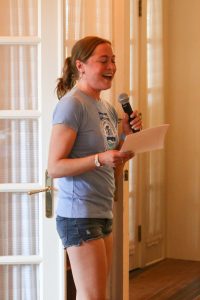The Story Behind Awareness
Written by |

Each time I meet someone new, CF pours from my mouth. It has become impossible to negate that intricate piece of who I am. Cystic fibrosis isn’t my whole life, but it has evolved me into the person I am today.
May marks Cystic Fibrosis Awareness Month. In recent years, I’ve used this month to educate others about my rare disease. It can be challenging to explain to others what CF is in its entirety, beyond the facts and mechanics of the disease. Highlighting what CF means on a personal level is entirely different from the factoids circling the internet.
Words carry weight we don’t always comprehend. I cringe every time I mutter the words cystic fibrosis to a love interest, stranger, or friend. I know they’ll follow up with preconceived notions of how to respond to my diagnosis. The list of discomforting replies is endless: “When did you get that?” “I know someone who died of CF.” “Oh, wow, you’re 33 and still alive? Great job!”
I know they don’t mean harm — most of the time — but that doesn’t prevent those arrows from piercing my heart. Those words used to destroy me; my lips would quiver beneath a blubbering mess of tears running into snot. However, I have developed better coping strategies to shield my innards from the fiery attacks.
I face two choices in these encounters: retort with angry responses or use the situation to educate others. 92% of the time, I choose the latter. I admit, some days I choose the former because I’m just “over it.” (Expecting perfection is never realistic!)
Harmful language prevents us from connecting on deeper levels. Intentional listening affords us the opportunity to understand each other’s unique perspectives. We all are flawed humans. We don’t know everything about all the things. Sometimes we mess up and respond from our pain, using words that cut rather than heal.
Sometimes, we don’t even realize that our words cut. Pity and desires to fix or remove painful experiences can be harmful. These notions create shame; we then wonder if something is inherently wrong with us. When others feel bad for us, we feel the need to assure them that we are OK, even when we’re not. This vicious cycle prevents us from getting the effective support we so desperately need.
The emphasis on awareness as a means of sharing only CF factoids inhibits others from connecting with us as fellow human beings. Bridging the gap between education and the human connection begins with nourishing desires to develop understanding. The goal of awareness is to draw closer to each other. The knowledge of how our bodies operate fulfills only a slice of our need to be seen in our entirety.
Our souls cry out to be seen beyond our invisibility. What we long to have people see is not our unseen disease itself, but the parts of us that have been changed because of it. Every breath taken is a gift; we combat anxiety, depression, and trauma daily; we power through neverending surgeries, tests, or hospitalizations. Sometimes breathing is our only feat of the day, yet surviving is enough. Our tenacity, perseverance, and valiance propel us forward into living each day despite how we feel.
Despite these strengths, CF prevents us from participating in certain activities beyond our body’s ability. Longing for belonging in groups leaves us with the feeling of not being able to measure up. Watching from the sidelines as others live normal lives hinders our ability to join communities. The societal message seems to be, “When you can join our world, let us know.” We will never reach that immeasurable standard. We long to hear, “Come join our world as you are — we’ll make space for you.”
Awareness means honoring our individual path, devoid of expectations that fit into the prefabricated box of societal measurements based on health status, careers, and relationships. Contrary to the belief that our lives will begin once we’re “healthy,” we aren’t waiting for the unachievable goal of perfect health. We are living each day. If we wait until we feel better, until we get the surgery, until we get the right medication, until we get a transplant … we will wait our life away and not actually live.
Our goal should always be to approach people and situations with the intent to understand. Our society has been conditioned to look away from those who are suffering. We haven’t been taught how to show up for others and stay through every season. This mindset is counterintuitive to authentic connection. Remaining with others in their pain is how we bond on a deeper, more meaningful level. Resetting the precedence begins with changing perceptions, which creates inclusive communities.
The message of awareness everyone needs? You matter. You are worthy. You belong here — as you are.
***
Note: Cystic Fibrosis News Today is strictly a news and information website about the disease. It does not provide medical advice, diagnosis, or treatment. This content is not intended to be a substitute for professional medical advice, diagnosis, or treatment. Always seek the advice of your physician or other qualified health provider with any questions you may have regarding a medical condition. Never disregard professional medical advice or delay in seeking it because of something you have read on this website. The opinions expressed in this column are not those of Cystic Fibrosis News Today, or its parent company, Bionews Services, and are intended to spark discussion about issues pertaining to cystic fibrosis.









Leave a comment
Fill in the required fields to post. Your email address will not be published.